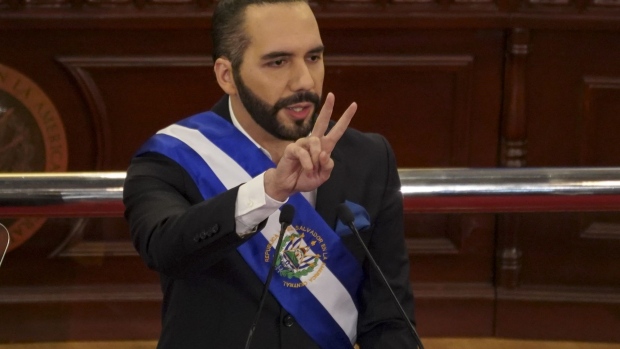Sep 16, 2022
El Salvador’s Bukele Seeks Re-Election Bolstered by Crime Fight
, Bloomberg News

(Bloomberg) -- El Salvador’s Nayib Bukele will seek to stay in power after his current presidential term ends in 2024, following on the footsteps of other Latin America leaders from Venezuela’s Hugo Chavez to Colombia’s Alvaro Uribe who overturned constitutional limits to stay in power.
In a speech on the nation’s independence day, the 41-year-old leader said he anticipated criticism from foreign governments over his plan.
“It’s certain that more than one developed country won’t agree with this decision,” Bukele said Thursday evening. “But they’re not the ones who get to decide. The people of El Salvador do.”
His plan to seek a second five-year term triggered criticism from human rights groups, which said it undermines democracy and the rule of law in the Central American nation.
“The future of El Salvador’s democracy is more at risk than ever, in the face of a decision that blatantly exemplifies the government’s authoritarian tendencies,” said Tamara Taraciuk of Human Rights Watch, in response to questions.
The Atlantic Council, a Washington-based think tank specialized in international affairs, described Bukele’s move as the “final step of his power grab.”
“President Bukele is marshaling the branches of government to replace rule of law with whatever he says is the will of the people, said Maria Fernanda Bozmoski, a deputy director at the council. “It’s not a new tactic by Latin American strongmen, but it is a tactic that without exception has portended disaster for the people.”
Removing Checks and Balances
Bukele, who made Bitcoin his nation’s legal currency and jailed tens of thousands of gang members, enjoys high approval ratings, despite criticism from human rights groups and warnings from credit ratings agencies that the country is close to default.
Read more: Taking Stock of El Salvador’s Bitcoin Gamble at One-Year Mark
Bukele’s ruling party, Nuevas Ideas, last year used its majority in congress to fire judges and take control of the top court, removing an obstacle for the president to seek another term. That led the US State Department to warn of a “decline in democratic governance.” The Organization of American States also criticized the move.
No one who has held El Salvador’s presidency for more than six months during the immediately preceding period, or within the last six months prior to the start of the presidential term, is eligible to run for president, according to a copy of the nation’s constitution published on the OAS website.
Ahead of Bukele’s announcement, El Salvador’s credit rating was downgraded by Fitch Ratings, which said that its high current-account deficit and large upcoming amortizations on international debt make “default of some sort probable.” The new CC rating means that Fitch considers the Central American nation’s debt to be riskier than that of war-ravaged Ukraine and the Republic of Congo.
Read more: El Salvador Cut by Fitch as Default Becomes More ‘Probable’
Bukele’s move “leaves little hope that the perspective improves from now until the election,” said Alejandro Arreaza, an economist at Barclays in New York. “That revives the tension with the US which will probably restrict access to multilateral financing.”
Debt due in 2041 edged lower to 31.7 cents on the dollar on Friday, according to indicative pricing data collected by Bloomberg.
(Adds comments from Human Rights Watch, Atlantic Council and Barclays. A previous version of this story corrected El Salvador’s credit rating in penultimate paragraph.)
©2022 Bloomberg L.P.





